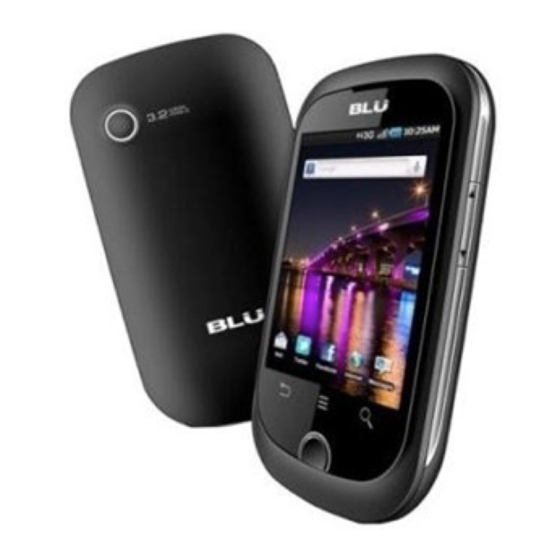
Table of Contents
Advertisement
Quick Links
Advertisement
Table of Contents

Summary of Contents for BLU Products BLU DASH
- Page 1 SERVICE MANUAL BLU DASH...
-
Page 2: Table Of Contents
Contents 1. Summary ................................4 1.1 Mobile Feature ............................4 1.2 Mobile Application System........................4 1.3 RF Part ..............................6 1.3.1 Transmitter ..........................7 1.3.2 TX Part ............................7 1.3.3 Frequency Synthesizer ... - Page 3 ATTENTION Boards, which contain Electrostatic Sensitive Device(ESD), art indicated. Following information is ESD handling: Service personnel should ground themselves by using a wrist strap when exchange system boards. When repairs are made to a system board, they should spread the floor with anti-static mat which is also grounded. Use a suitable, grounded soldering iron.
-
Page 4: Summary
1. Summary This manual describes the troubleshooting and repair process of baseband, RF and multimedia part of mobile phone, which developed by BLU based on the platform MT6573 of MTK. To other platforms of MTK for reference only. MT6573 is a highly integrated 3.75G baseband SOC platform which incorporates advanced features like HSPA R6 modem,676MHz ARM11 CPU, OpenGL ES 2.0 3D graphics,8M camera ISP, Programmable hardware video codec, and FWVGA display. - Page 5 1-2-1 chip block diagram MT6573 baseband chip application, as Image 1-2-2:...
-
Page 6: Rf Part
1-2-2 chip typical application 1.3 RF Part RF part mainly includes antenna system, transmit access, receive access and frequency synthesizer for GSM or UMTS channel tune . RF circuit mainly finish wireless signal receive and sending, it completes voice and signal duplex transmit with BTS by air interface. -
Page 7: Transmitter
1.3.1 Transmitter 1) Low noise GMSK/8PSK/3G TX modulator eliminating external SAW filters, with Direct-Frequency Modulation TX for GSM mode; 2) Dedicated Tx drivers can support radio configuration with multi-mode multi-Band Pas; 3) Excellent 3G EVM performance over the full Tx dynamic range; 4) High dynamic range integrated synchronous power detector, with ultra-fast TX power control support;... -
Page 8: Program Memory And Logical Control Part
1-4-1 PMU block diagram 1.4.3 Program Memory and Logical Control Part MT6573 platform storage circuit is completed by MCP, usually 4Gbit/2Gbit DDR + 4Gbit/4Gbit NAND. BB Chip has a special EMI interface used to access external Memory; currently we used in most of our projects is the MCP, the future may be used Nand Flash (by NFI interface access).MCP stores important communication protocol software and mobile control program and MMI software. -
Page 9: Sim And T-Card Interface
1-4-3 LCD and Camera interface 1.4.6 SIM and T-card Interface The circuit of audio interface is shown as Image 1-4-4:... -
Page 10: Usb And Tp Interface
1-4-4 T-card and SIM Interface 1.4.7 USB and TP Interface DASH support USB2.0 High Speed Data transmission, support Capacitive Touch Panel, the interface is shown as Image 1-4-5: 1-4-5 USB and TP Interface... -
Page 11: Mobile Maintenance Guide
2. Mobile Maintenance Guide In mobile circuit system, all lines can be divided into three types: power supply line, control line and signal line. When analyze fault, for active device, we can check power supply line first, and then check control line, at last check signal line, expel fault step by step. -
Page 12: Baseband Common Fault
2-2 PCBA negative diagram The following project will introduce the troubleshooting process of mobile phone of motherboard. 2.1 Baseband Common Fault 2.1.1 “Cannot download” fault check flow... -
Page 13: Cannot Power On" Fault Check Flow
Notice: MTK continuously updated FlashTool, please use the latest Flash Tool. 2.1.2 “Cannot power on” fault check flow... -
Page 14: Cannot Charge" Fault Check Flow
Notice: Before formatting, please save the final calibration measure information of the cell phone, formatting and re-written into the mobile phone after formatting. Or make the final measurement calibration again after formatted. 2.1.3 “Cannot charge” fault check flow... -
Page 15: No Vibration
2.1.4 No Vibration 2.1.5 No Ring... -
Page 16: No Echo (The Other Side Cannot Hear The Voice)
2.1.6 No echo (The other side cannot hear the voice) 2.1.7 No echo (Cannot hear the other side's voice) -
Page 17: Lcd Shows Abnormal
2.1.8 LCD shows abnormal 2.1.9 Camera abnormal... -
Page 18: Capacitive Touch Panel Abnormal
2.1.10 Capacitive Touch Panel abnormal 2.1.11 “Can not recognize T Card” fault check flow... -
Page 19: Cannot Recognize Sim Card" Fault Check Flow
2.1.12 “Can not recognize SIM Card” fault check flow... -
Page 20: Als/Ps Sensor Abnormal
2.1.13 ALS/PS Sensor abnormal... -
Page 21: Rf Common Fault
2.2 RF Common Fault 2.2.1 “Low receive sensitivity” fault check flow 2.2.2 “Large Frequency difference” fault check flow... -
Page 22: Cannot Transmit" Fault Check Flow
2.2.3 “Cannot transmit” fault check flow... -
Page 23: Cannot Receive" Fault Check Flow
2.2.4 “Cannot receive” fault check flow... -
Page 24: Mt6620 Common Fault
2.3 MT6620 Common Fault MT6620 is a 4-in-1 wireless communication device which includes a) WLAN b) Bluetooth c) GPS d) FM Transmitter and Receiver The MT6620 module on the board as shown in Figure 2-3: 2-3 MT6620 module 2.3.1 GPS Fault... -
Page 25: Wifi/Bt Fault
2.3.2 WIFI/BT Fault 2.3.3 FM Fault...









Need help?
Do you have a question about the BLU DASH and is the answer not in the manual?
Questions and answers